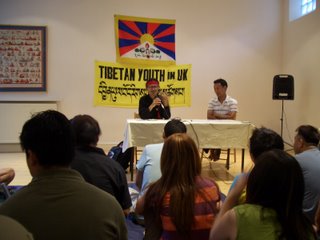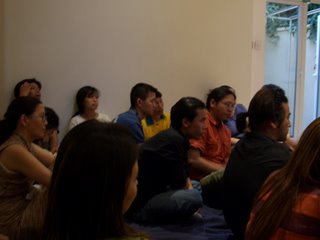Saturday, July 29, 2006
China's "Railway To The Roof Of The World" Is Sinking And Cracking
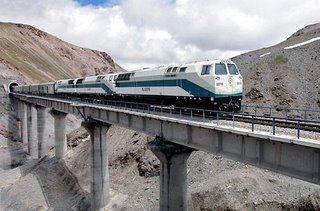
Komfie Manalo –
All Headline News Foreign Correspondent
Chinese Railway Ministry spokesman Wang Yongping explains the problems with the railroad to Lhasa in
"The concrete is cracking on some of the railway structures and bridges, forming a hidden danger to the railway line quality."
Chinese President Hu Jintao opened the railway to the Tibetan capital of
The $4.2 billion railway which runs 1,142 kilometers from the Golmud desert in
It climbs a peak of 5,072 meters above sea level along the Tibetan plateau, with the railway using supposedly state-of-the-art cooling techniques to ensure the permafrost foundation remains frozen.
Yaks threaten China's 'miracle' train line
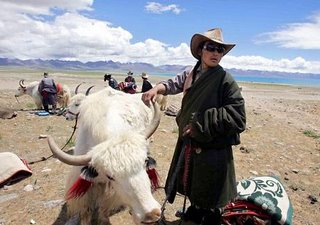
Jonathan Watts in
Friday
The Guardian
The safety of passengers on the world's highest - and newest - railway is threatened by cracks, yaks and shifting sands, the Chinese government has admitted.
Less than a month after the opening of the line across the
Crossing the rugged
The line depends on coolants to stop the ice upon which it rests from melting. But global warming has raised temperatures in the mountain region faster than expected. As well as damaging concrete pillars and bridges, it has added to the problem of sand dunes that encroach upon the track.
Tunnels were built under elevated sections so that the endangered Tibetan antelope could pass by without danger. But planners have failed to cope with a far less timid and more numerous beast - the yak, thousands of which graze along the tracks and wander across them.
"These form dangers to passengers on the train," Mr Wang said. Click Link for More
http://www.guardian.co.uk/china/story/0,,1832885,00.html/
http://www.allheadlinenews.com/articles/7004364128/
http://indiaenews.com/2006-07/16578-controversial-tibet-railway-sinking.htm/
http://www.chinadaily.com.cn/china/2006-07/28/content_652320.htm/
http://seattletimes.nwsource.com/html/traveloutdoors/2003156488_webtibettrain28.html/
Tuesday, July 25, 2006
Commentrary manuscript lands Tibetan youth 10 years in prison
According to confirmed information received by the Tibetan Centre for Human Rights and Democracy (TCHRD), a 29-year old Tibetan youth, Dolma Kyab, has been sentenced to ten years’ imprisonment term for writing and maintaining a commentary manuscript about Tibet. He is currently imprisoned at Chushul (Ch: Qushui) Prison, "Tibet Autonomous Region" ("TAR").
Monday, July 03, 2006
Tibetan dissident to accuse Chinese of Torture & Genocide
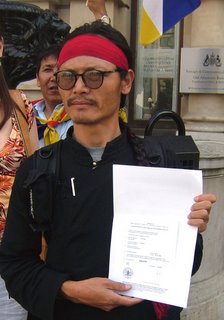 Tenzin Tsundue, a Tibetan poet and activist, takes his fight to Britain today when he files a sworn testimony detailing atrocities he says he saw and experienced while in prison in the remote Himalayan region.
Tenzin Tsundue, a Tibetan poet and activist, takes his fight to Britain today when he files a sworn testimony detailing atrocities he says he saw and experienced while in prison in the remote Himalayan region.Mr Tsundue's testimony is a stark litany of beatings and torture doled out during his imprisonment without trial in 1999, and will be submitted today to the Foreign and Commonwealth Office legalisation office, where it will be officially notarised.
The testimony is for a criminal suit filed in Spain's High Court by three Tibet support groups accusing former president Jiang Zemin and ex-parliament chief Li Peng, both of whom retired in 2003, of committing genocide and crimes against humanity in Tibet.
"Many European countries speak of peace and human rights and harmony. But on business they all cosy up to China, it's hypocritical. Through asking for justice in an international court I hope they will have second thoughts," Mr Tsundue said. "The Tibetan people should have the right to run their own country, not the Chinese people," he said.
The case accuses the retired leaders, who were in office during the 1980s and 1990s, of authorising massacres and torture in Tibet. The court could call for the Chinese government to arrest those accused of human rights abuse - and even impound their property.
Tibet has been under the control of China since 1950 when the People's Liberation Army marched into Tibet. Less than a decade laterthe Himalayan region's spiritual leader, the Dalai Lama, fled after a failed uprising. Tales of torture and abuse have abounded over the past four decades.
China has condemned the lawsuit, calling it absurd, and Beijing has accused Madrid of meddling in its affairs. Madrid is also investigating charges of genocide against the Falun Gong spiritual movement.
Emilie Hunter, a spoke-sperson for the Madrid-based Friends of Tibet Committee, said she hoped that the effect of filing the testimony in Britain would be to stimulate broader government and public interest in the issue. More....................
